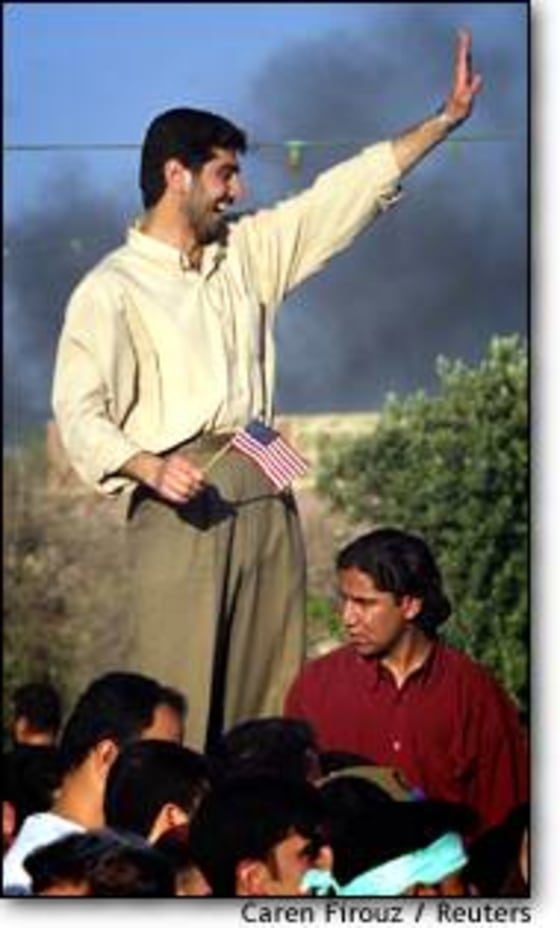At the first Friday morning market after the end of Saddam Hussein’s rule over this northern Iraqi city, awash in oil and a kaleidoscope of ethnic groups, an Arab, a Kurd and a Turkoman readily defined Kirkuk’s aspirations and pitfalls.
Kirkuk survived its collapse on Thursday remarkably intact. Of more than 100 oil wells in and around the city, only one belched thick black smoke into the blue sky, a casualty of quickly retreating Iraqi forces or a stray U.S. bomb. No one seemed to know which.
Also remarkable was the sense of calm prevailing in the city. Small-scale looting of buildings associated with Saddam’s rule continued. But private shops and homes remained untouched, awaiting their owners’ return. In the central bazaar, which sits under Kirkuk’s ancient citadel, it was business as usual. And that’s the way local merchants say it should be. After years of Saddam’s tinkering with Kirkuk’s ethnic balance — banishing Kurds and Turkomans and resettling Arabs in their place — it was time to come together.
“These were the regime’s policies,” said Saman Othman, a Kurdish cigarette trader who said he welcomed a chance to put his degree in English language to practice. “We don’t blame each other. Kurds, Turkomans and Arabs have lived here for centuries. We get along.”
‘THE BAD PEOPLE ARE GONE’
Other residents from Kirkuk’s main ethnic groups concurred. They said Saddam’s attempts to bolster the Arab population would simply become a part of history.
“Good people are everywhere here,” said Ahmed Hussein, an Arab who was jailed by the regime for draft dodging. “The bad people are now gone.”
“Look,” said Farouq Jabar, “I am a Turkoman. Here is an Arab, and here is a Kurd,” he said, pulling two other market sellers toward him. “We will live together, just like we always have.”
When Kurdish rebels, followed by U.S. special operations forces, rolled into Kirkuk on Thursday, almost the only shots fired rang out in celebration. The Iraqi army, and officials of Saddam’s Baath Party, made a quick retreat as Iraqi defenses around Kirkuk crumbled.
Kurds, Turkomans and Arabs, which represent nearly equal parts of Kirkuk’s population, said Friday that they welcomed the Kurdish forces. But all agreed that a continued Kurdish military presence could be detrimental to Kirkuk’s future. Although the Kurdish forces have showed discipline by preventing large-scale looting and chaos, they are expected to be replaced by U.S. troops — a nod to Turkey, Iraq’s northern neighbor, which sees Kurdish control of Kirkuk, and the city’s Turkoman population, as a springboard to an independent Kurdistan.
With a large Kurdish population of its own, Turkey fears its Kurds would follow suit. “We need to see more Americans,” said Mustafa Mohammed, a 31-year-old Turkoman food trader. “The Americans will see that we all get full rights.”
CIVIL AND ETHNIC ORDER
Outside the former city headquarters of Saddam’s mukhabarat, or security force, Kirkuk’s new police chief, Khatab Arif, said his job was to guarantee civil and ethnic order. A symbol of Saddam’s rule, the mukhabarat office was gutted by marauding Kirkuk residents looking for loot and revenge. For a visiting reporter, a Kirkuk policeman gleefully re-created Thursday’s jubilation by drop-kicking a poster of the Iraqi dictator.
“We will create a police force to provide security to everyone,” said Arif, although he admitted he might have to defer to the Americans. “Kirkuk’s liberation would not have been possible without them,” Arif said. “We will welcome their participation in Kirkuk’s future.”
Striking a balance, human rights groups say, will be the biggest challenge. The thousands of Arab families forcibly resettled in Kirkuk by Saddam are also victims. It is believed that many have fled the city, fearing reprisal attacks by Kurds and Turkomans.
Over at the former Saddam Hospital, hastily renamed the Kirkuk Hospital on Friday, doctors said they were trying to lead by example. The hospital’s Arab director, 40-year-old Ali al-Biyati, is a third-generation Kirkuk resident. A full staff of Kurd, Arab and Turkoman doctors, nurses and technicians has stayed on, he said.
“The Iraqi people are one,” he said. “We are no different from each other.”
(MSNBC.com’s Preston Mendenhall is on assignment in Iraq.)
